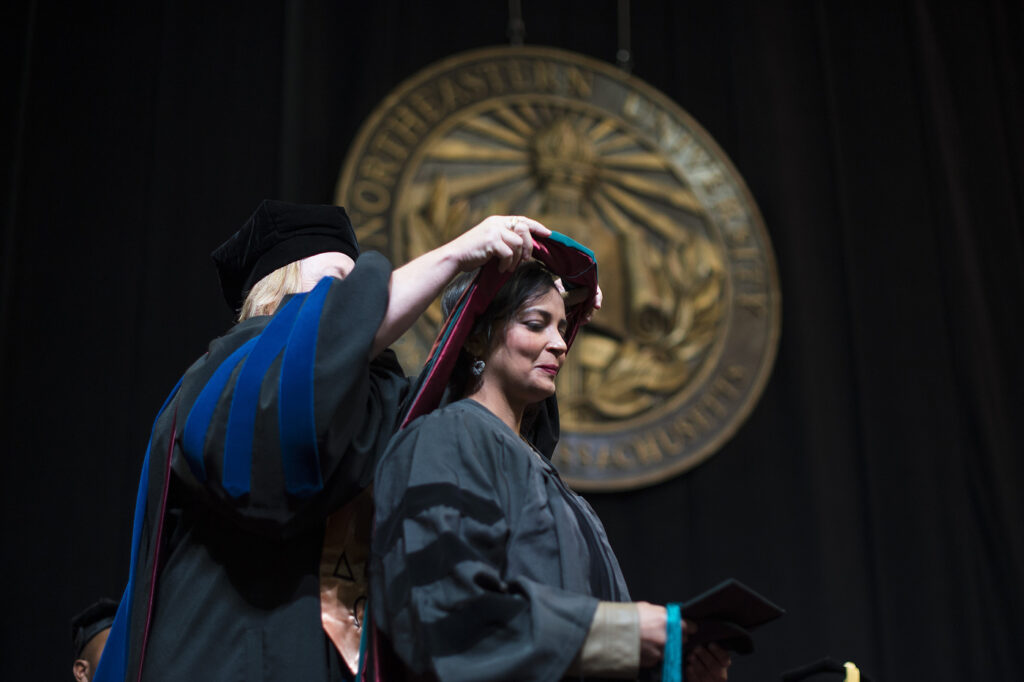When students graduate with their EdD at Northeastern’s College of Professional Studies, they have already made an impact. That’s because the EdD program is centered on principles of “action research” and the dissertations involve comprehensive research, as well as thoughtful implementation.

Sara Ewell, Joe McNabb, and Joan Giblin collaborated on a comprehensive overview of national research led by EdD students around the country. This two-volume book highlights the work of graduate students whose EdD programs share Northeastern’s partnership with the Carnegie Project on the Education Doctorate (CPED) – an international organization dedicated to transforming the Education Doctorate into the Professional Practice Doctorate in Education.
According to its website:
“Members are committed to rethinking advanced educational preparation through improved EdD program designs that offer academic rigor, practical impact, applied research, and value. CPED, the first action-oriented effort working to distinguish the EdD from the PhD, defines the EdD as one that prepares educators to become Scholarly Practitioners who can apply appropriate and specific practices, generate new knowledge, and steward the profession.”
The books are available at Information Age Publishing: https://www.infoagepub.com/authors/joe-mcnabb
We sat down with one of the collaborators, professor of practice and full-time faculty member, Joe McNabb, to learn more about the importance of this work and the value of Northeastern’s EdD program.
Q: What is “action research”
Action research is really at the heart of how we establish the EdD as an advanced professional degree — such as a Doctor of Nursing Practice (DNP) or Doctor of Psychology (PsyD) — versus a PhD which is more of an academic research degree. It moves away from traditional research by taking the step beyond just making recommendations, to actually implementing change based on rigorous research findings. For EdD students, when they graduate with their doctorate, they are armed not only with a degree but with a story of how their research resulted in meaningful change with significant impact.
Q: Why is this approach to “action research” so important?
Action research can empower all administrators in higher education to engage more effectively in resolving challenges in colleges and universities.
The first volume of the work we published, Faculty Development: Achieving Change Through Action Research, presents a compelling collection of chapters that explore faculty development through the lens of action research, tackling a diverse array of challenges with innovative solutions. Chapters include Cragg’s investigation into the barriers preventing faculty from implementing digital formative assessments in a top-tier business school highlights crucial issues of self-efficacy and time. Brewer’s examination of developmental English courses offers insightful structural and pedagogical strategies to enhance student success.
The second volume, Taking Action: Creating Sustainable Change in Student Affairs is an insightful compilation that utilizes action research to tackle complex issues in student development and support. Through a series of chapters, the volume delves into various facets of student life and administration, offering valuable findings and recommendations such as Tresselor-Gelok’s exploration of leadership styles in student affairs and Bevins’ work that highlights the benefits of peer-mentoring for first-generation students’ financial resource access.
Q: How did you decide what students to include in the book?
We did an open call for book chapters and reviewed all the proposals. Those that we kept were those that really demonstrated the impact of action research. We looked for highly rigorous research as well as measurable impact. The call was answered by universities across the country who are part of the CPED network, and the results were truly moving.
Q: Why did CPS decide to join the CPED network?
Sara Ewell was the vision for moving in this direction. We wanted our students to do something with their degree instead of just getting a piece of paper. She really created this vision in 2017 and 2018. We introduced the program in Fall 2018 — pivoting away from the traditional model so our students can take away high-impact skills.
This is even more meaningful when you consider the mean age of our students is 43. Most are mid-career professionals who are looking for ways to not only advance their careers, in higher ed, K-12, or non-profit spheres but make an impact. We have students from all over the country, representing community colleges, private liberal arts colleges, specialized colleges in fashion and design, prestigious global research universities, and Ivy League and public research universities. It really is a broad and diverse network of seasoned professionals generating remarkable work.